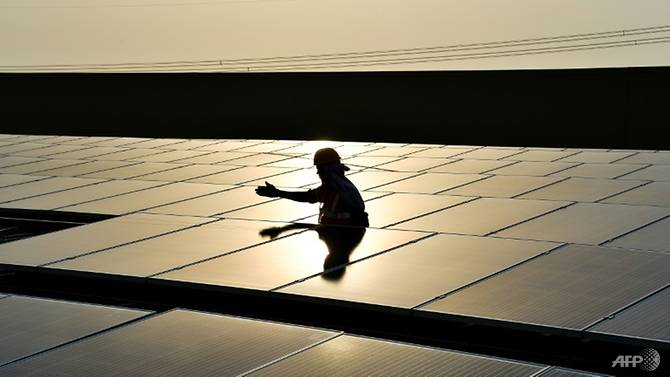Norway solar firm signs US$2.9 billion deal with Iran
 |
| Norway's Saga Energy will work with Iran's Amin Energy Developers to install two gigawatts of solar panels around the central desert region. (Photo: AFP/Chandan Khanna) |
"Norway is fully committed to the JCPOA (nuclear deal) and this is proof that we have taken the opening very seriously, and we will see more investment very soon," Norwegian ambassador Lars Nordrum told AFP.
He was hosting the signing at his Tehran residence between Norway's Saga Energy and Iran's Amin Energy Developers, who will work together to install two gigawatts of solar panels in multiple sites around the central desert region.
That makes it the second-largest investment deal in Iran since the 2015 nuclear deal eased global sanctions, and dwarfs the 600 megawatt solar project finalised just last month between Iran and British investment fund Quercus.
The timing was coincidental, but comes just days after Trump's bellicose speech in which he called for further sanctions on Iran.
It underlines the challenge Washington hardliners will face in trying to convince Europeans, who have remained firmly behind the nuclear deal, to abandon their burgeoning ties with the Islamic republic.
The Norwegian project is being financed by a consortium of European private and state investors, and backed by a sovereign guarantee from the Iranian government.
"I'd like to thank Norway, which has always been one of the best friends to Iran, for this exciting opportunity," said Saeid Zakeri, head of international affairs for Amin.
BUSINESS RISK
European and Asian businesses have shown great interest in tapping into Iran's relatively wealthy and largely untouched market of 80 million people.
But continuing US sanctions on Iran, and Trump's aggressive rhetoric, have bred a crippling uncertainty that mean many investment plans are stuck on the drawing board.
There have been a few big deals, most notably France's Total, which signed a US$5 billion gas deal in June alongside China's CNPC.
A few other major firms such as Siemens, Renault and Peugeot have extensive investments.
Solar projects are particularly important for Iran, which has severe pollution problems, as well as facing existential environmental threats from desertification and warming temperatures.
"We expect there to be some business risk in the Middle East, and Europe stands united in its support of the JCPOA," said Nordrum. "This is a great win because Iran really needs renewables and this is a new sector for us," he added.
Saga is a young company, formed by former oil and gas project managers and engineers who shifted into the renewables sector after traditional energy markets were badly hit by falling prices.
A partnership with Taiwan's Delta Electronics, a major player in the solar sector, has helped them mobilise large amounts of capital from Europe.
"We are a small company with mighty partners," said Saga's development manager Gaute Steinkopf at the signing.
"We hope to build a factory in Iran to build the panels so that we are also generating jobs here," he added.
The tough climatic conditions in Iran offer a chance for research as well as business.
"To withstand the heat here, you need very good panels. This is the huge challenge," said Saga director Rune Haaland.
"We want to learn more about this, and we're hoping to establish a relationship between a university here and in Norway," he said.
What the stars mean:
★ Poor ★ ★ Promising ★★★ Good ★★★★ Very good ★★★★★ Exceptional
Latest News
More News
- Foreign leaders extend congratulations to Party General Secretary To Lam (January 25, 2026 | 10:01)
- Russian President congratulates Vietnamese Party leader during phone talks (January 25, 2026 | 09:58)
- Worldwide congratulations underscore confidence in Vietnam’s 14th Party Congress (January 23, 2026 | 09:02)
- Political parties, organisations, int’l friends send congratulations to 14th National Party Congress (January 22, 2026 | 09:33)
- 14th National Party Congress: Japanese media highlight Vietnam’s growth targets (January 21, 2026 | 09:46)
- 14th National Party Congress: Driving force for Vietnam to continue renewal, innovation, breakthroughs (January 21, 2026 | 09:42)
- Vietnam remains spiritual support for progressive forces: Colombian party leader (January 21, 2026 | 08:00)
- Int'l media provides large coverage of 14th National Party Congress's first working day (January 20, 2026 | 09:09)
- Vietnamese firms win top honours at ASEAN Digital Awards (January 16, 2026 | 16:45)
- ASEAN Digital Ministers' Meeting opens in Hanoi (January 15, 2026 | 15:33)
















 Mobile Version
Mobile Version